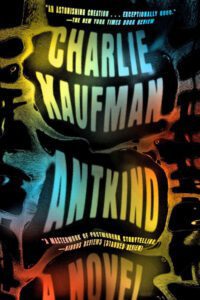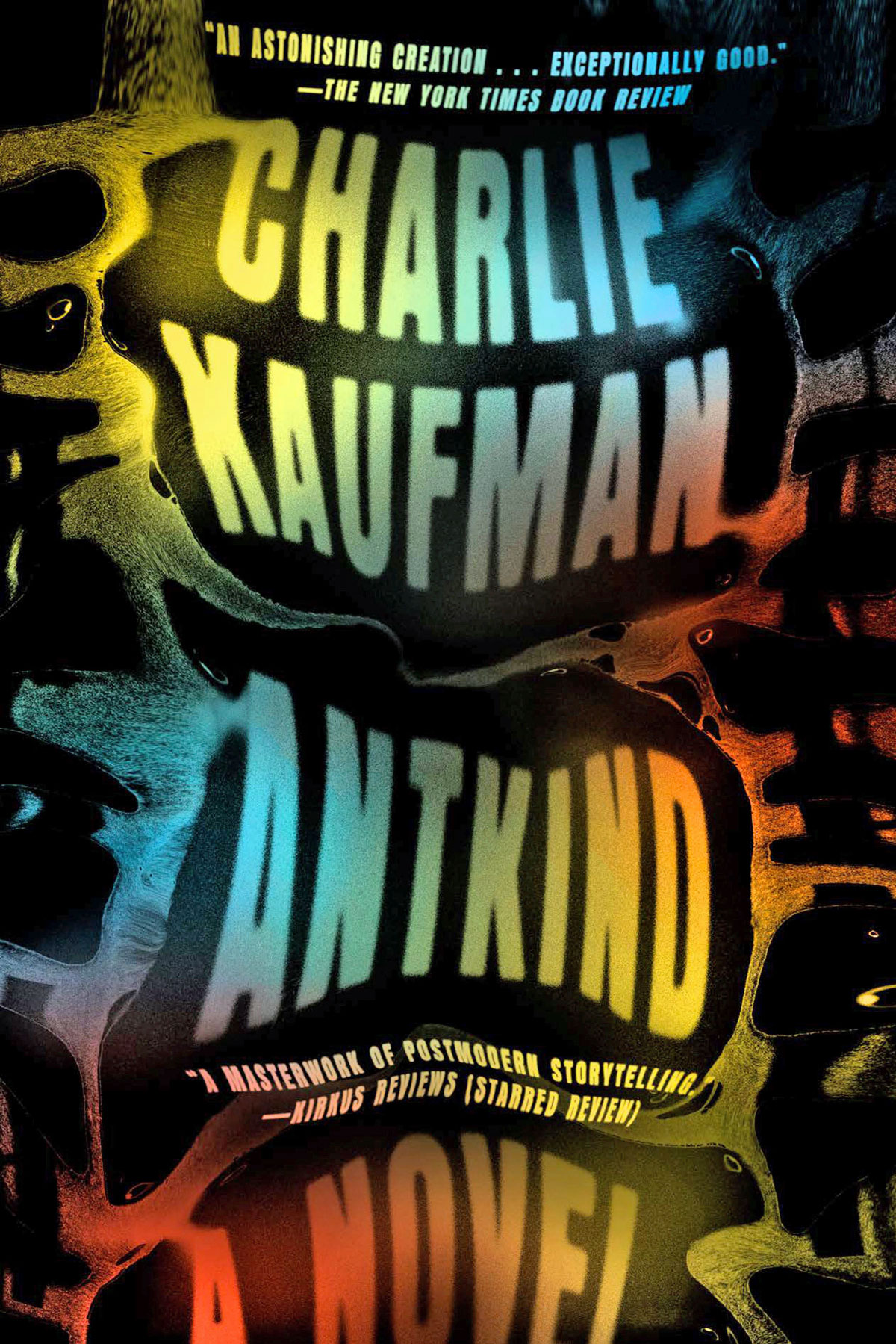
Author: Charlie Kaufman
Publication Year: 2020
Length: 720 pages
I’m not really sure what else I expected from Charlie Kaufman. This meta mess of a trip through his brain. Starring B. Rosenberger Rosenberg, the stand-in for Kaufman’s psyche. Pretentious, incredibly not self-aware movie critic who shits on Kaufman’s movies, but loves Judd Apatow. Who tries to make himself seem enlightened by constantly telling people about his black girlfriend. But also, constantly insisting that he’s not Jewish. This is all table-setting, of course, for what has to be the most fucked up book I’ve ever read. And I actually read the whole of Infinite Jest! And like 180 pages of Gravity’s Rainbow! So my hipster shithead bona fides are strong. And then less strong. I mean I’ve read some challenging, surreal books. (I’m looking at you Buddha’s Little Finger.) And some weirdo post-modern novels that seem to go out of their way to be either super-meta nonsense (The Raw Shark Texts) or just up their own ass with intellectual mumbo-jumbo that was way too too (The Tunnel), but Kaufman brings absurdity to the edge of… well, to the edge of absurdity.
I’m not sure I can really describe what happens in this book without a red string map and some ketamine. But the action all revolves around the aforementioned B. Rosenberger Rosenberg and his discovery that his neighbor, Ingo Cutbirth — sometimes an elderly black man and other times possibly a Scandanavian not-black dude — over the span of 90 years has created a 3-month-long film that B. considers a world-changing work of art. I should mention that this film is apparently a stop-motion production performed entirely by puppets. Though his description throughout doesn’t sound at all like something that could be accomplished with animation. Just one of the giant contradictions or ignoring of reality Kaufman employs during the span of the novel. And, of course, one of the self-referential activities as well. Because, as we all remember, Kaufman made a little film called Anomalisa. A film that is a stop-motion film made entirely with puppets! A film that he, under the guise of B., shits all over several times, calling it pretentious and a giant money suck for the idiots at the studio who green-lit it.
And, like Kaufman, I’ve gone down a hole. Or spun out. So, B. Rosenberger Rosenberg starts to watch the film, his neighbor dies during his viewing (he is very old, after all) and for some bizarre reason he decides to pack up all the reels and transport them across country in a U-haul. As with everything else in this loser’s life, things go awry, the old nitrate film catches fire and the film is lost. And now we get the plot… B. Rosenberger Rosenberg spends the rest of the book trying to recall every single detail of this sprawling film so he can — at different times — recreate it, write a book about it, lecture about it, glorify Ingo Cutbirth, change the world and so on. He employs psychiatrists to do reversion therapy, hypnotists and various others to help him recall his memory of the film. Despite claiming to have eidetic memory. Which he clearly does not. One of many claims B. makes in the book that are clearly a figment of his wild imagination or his deteriorating mental state.
The book continues to flip back and forth between B.’s real world and his memories of the film while under hypnosis (which are obviously not his memories of the film). And then sometimes the world of his dreams. Which are neither the real world, nor his memories of the film. All of these things become entangled to the point where it’s really difficult to figure out what’s what. Especially since his “memories” are so all over the place. There is absolutely no rhyme or reason when it comes to this film he feels is such an amazing film. But we, as the readers, have no clue what’s real and what isn’t. But from what we do see, this film is just not good. (At least in this critic’s estimation!) At some juncture in the book it seems Kaufman becomes bored or worn out with the mechanism of the third party putting B. under hypnosis and just invents a “switch” out of nowhere. Like B. literally has a physical switch installed that, when flipped, puts him instantaneously into the memory world of the film. So absurd.
We spend all 720 pages of this novel with B. Listening to him talk. Rolling around inside his head. Watching him interact (in reality and out of it) with other humans. By his account he is a Harvard-educated serious film critic and scholar. Yet every one of his books, articles and scholarly writings have really cheesy pun-laden titles. And he lectures at air conditioning technical schools. He goes out of his way to be super-PC to the point of stupidity and has that weird American Psycho, Patrick Bateman thing where he oddly explains typically derided pop-culture media (a la Phil Collins’ “Sussudio”) as great works of art. But also misquotes and misstates details about higher-minded art. On any subject he’ll claim to have minored in it at Harvard. He obsesses over women he meets in really unhealthy ways and is constantly falling down manholes (or “personholes” as he would call them, because he doesn’t want to gender the holes). At one juncture he gets a job at Zappos to intercept a pair of shoes from a woman he’s obsessing over and ends up in their speciality clown shoe division. He gets fired for masturbating at work… As the book progresses, and his dwindling income trickles to zero, his living conditions deteriorate, going from bed to “sleeping chair,” to a shared tiny space with a psychotic roommate, who also sleeps in a chair directly next to him. All of this character development — or character torture — is very reminiscent of Ignatius J. Reilly from A Confederacy of Dunces. A character who thinks he’s above it all, but is completely delusional to the reality of his situation. And, at times, it’s funny as hell. It’s wacky, but I vibed with Kaufman’s portrayal of this man-child and figured this was his skewering of the critic class and his own feelings about “artists” and his own place in that world. I got it. And I liked it.
But then we had the world inside his memory and his dreams. And this is where things go completely off the rails. The book just becomes completely chaotic and seemingly stream-of consciousness. There are several Abbott & Costello acts, including the actual Abbot & Costello who plot the assassination of one or more of their rival acts. There is a fast food empire called Slammy’s that seemingly takes over the world. And battles an army of identically cloned Trump robots. Some of whom B. is sexually attracted to. And maybe his old psychiatrist is some sort of evil Broadway acting overlord? But there’s also this future technology called Braino that can beam future memories into the dreams of current humans? And a sentient ant who invents a compound that moves backwards through time for some reason? And some world divide called the “seen” and “unseen” that is actually tied to Ingo’s film that causes B. to become a giant. And then everyone ends up living in a cave while the world burns and B. has imposter clones in some reality he ends up in who, unlike him, are Jewish. So he must murder them. And this is where, like the author and his character, my brain breaks.
I imagine there is some plan here. Some connector to all the swirling, surreal craziness. How this obnoxious, damaged man ties to Kaufman. How his growth and semi-enlightenment over the course of the novel matches Kaufman’s. How this life-altering film ties to the creative process. How this book meta-ties to Kaufman’s writing of it. Because I’m sure all of these things are a thing. I feel like all the contradictions and ignoring the way reality typically works is a window into his brain. And the clowns. Always with the clowns. It is a theme in all of Kaufman’s works. This confounding process of delving into the jumbled, conflicting thoughts of his main character. The surreal nature of time and memory. And lots and lots of regret. But this time, he is the main character. Or his brain is. As we watch in meta form his psyche barf itself out all over the page. It’s a weird place to be, no doubt. But is, at times, fascinating. And hysterical. But also confusing and frustrating. And goofy and, at times, groan-inducing. It has shades of those conversations you’re having at a party where you can feel yourself talking but are actually inside your own head telling yourself to shut up. Whatever the case, I think different people will take different things away from this read. I’m glad I persevered and made it through to the end. Despite sometimes wishing to excise certain storylines and/or skip them all together. Because you never knew what was around the corner of Kaufman’s mind.


